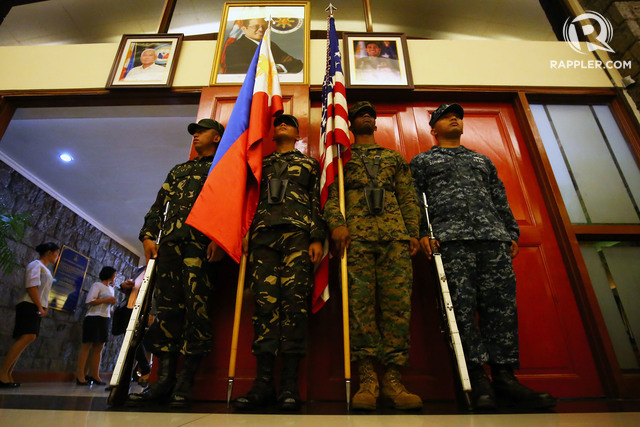Precious blood continues to pour in Mindanao, as fighting on several fronts proceeded unabated. It is not a question of whose blood are wasted; they are still precious blood --- and should not be shed at all if there is a way to stop it. On April 9, 18 Philippine Army soldiers killed, with 53 more wounded, during the April 9 firefight with 120 Abu Sayyaf Group (ASG) gunmen in Barangay Baguindan, Tipo Tipo, Basilan. This is not to include those who died during firefights with ASG in Sulu, BIFF in Maguindanao, and ISIS-oriented youths in Butig, Lanao del Sur.
One can argue that the blood of ASG, BIFF, and ISIS-oriented youths or simply terrorists, kidnappers, or radicals are not worthy to save, because anyway they are enemies of the state; or more lightly, they do not engage in peace process with the government. This is absolutely outside the point. The point is that while everybody knows the way to stop or minimize this blood-letting is through the honest implementation of commitment of government, say the passage of the BBL, the decision-makers, who are mostly belonging to the vested interest groups, use every means to frustrate it. In their very nature, vested interest groups are selfish, monopolistic, and greedy. They want to maintain or control an existing system or activity from which they derive private benefit. The fear the people, especially the Moros, who are always tagged as “secessionists”.
Clearly, the decision-makers preferred to drag the resolution of the conflict and enjoy on the process, rather than resolve it by implementing what has been agreed by the Parties, say the establishment of genuinely autonomous Bangsamoro entity in Mindanao, but they lose their privileges and gains out of the current system and status quo.
What worsens the situation and dims the horizon is the difficulty facing the MILF. Its moral ascendancy is thinning down because its thesis that the best way to resolve the conflict in Mindanao is through political negotiation does not hold currency. It is being questioned as a good policy; and worse, the MILF is branded as “being fooled” by the government.
In a situation where there is high state of frustration, radicalisation of ideas and approaches is the necessary consequence. The pattern is clear in many instances. Look at the Israeli-Palestinian conflict. As the conflict drags on for several decades, and the two-state solution is not moving due to Israeli’s arrogance and expansionist policies, several new groups emerged: Hamas, and a dozen more radical groups both Islamic, Christian, and leftists. The original 7-member organizations Palestinian Liberation Organization (PLO) has been accused rightly or otherwise of being compromised too far, the consequence of being a very moderate organization. Similarly, from 1972 to 1977, there was only one liberation organization in Mindanao, the Moro National Liberation Front (MNLF). As the resolution of the conflict protracts, mainly due to government’s non-compliance, there came into being the MNLF Reformist Group, the Islamic Command Council, Committee of 15 or MNLF-Sema Wing, MNLF Isnaji Wing, the MILF, and now the BIFM/BIFF, Abu Sayyaf Group (ASG), ISIS-oriented youths.
With this developing situation, the government has to make a decision. Which is preferable an endless chaotic situation where there is virtually civil war in Mindanao or as quickly as possible pass the BBL with the MILF (and the various MNLF factions on board) as partners in peace, progress and development in Mindanao. And more importantly, with the guns silenced in Mindanao, the government can train its focus on the South China where China is steadily gaining ground. In this particular instance, decisive leaders are required. This makes the forthcoming presidential elections very relevant.
http://www.luwaran.com/home/index.php/editorial/25-january-16-23/682-bloodletting-continues-in-mindanao


